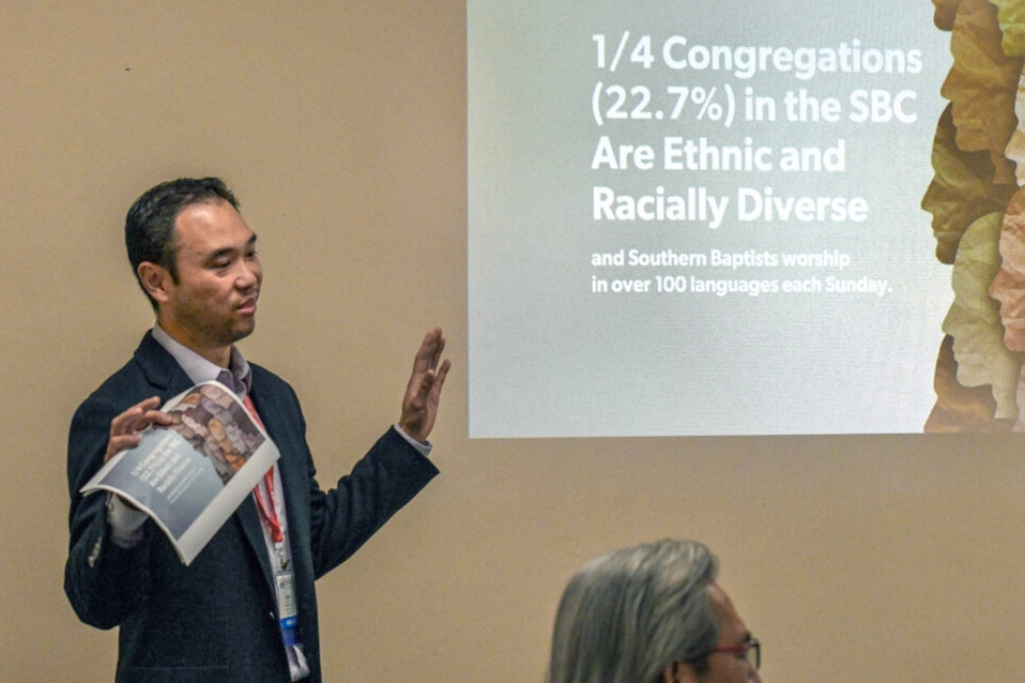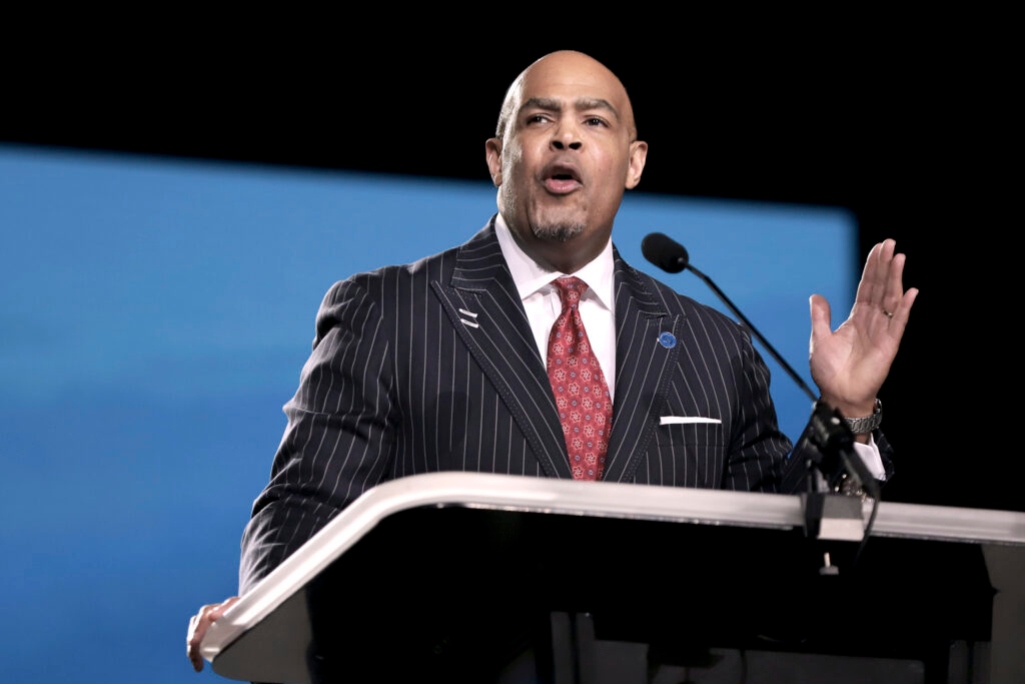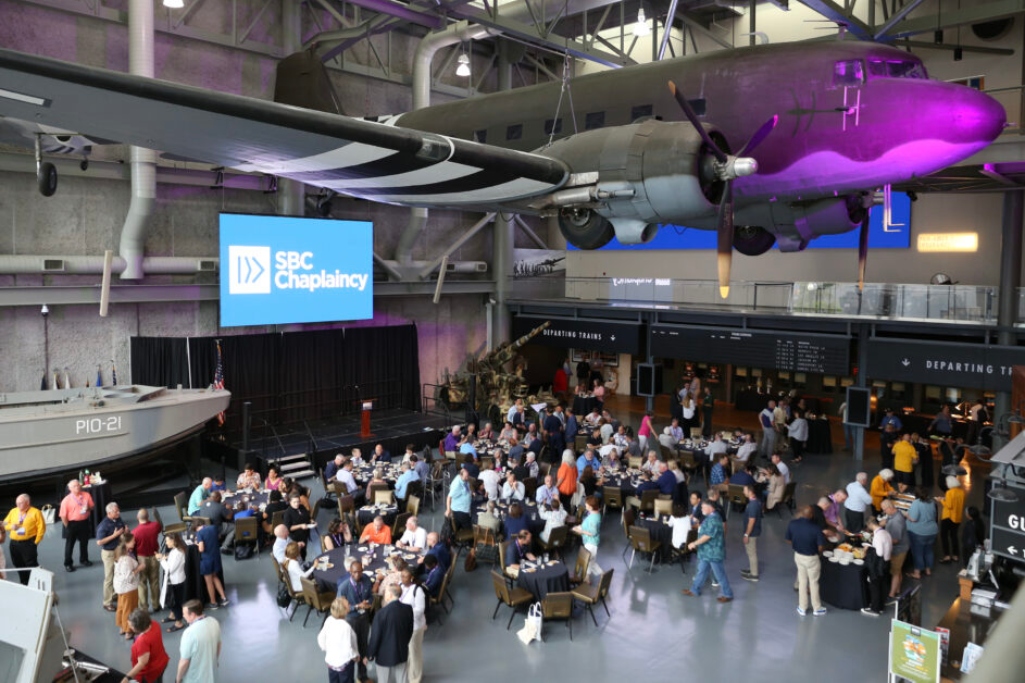
Carter Tan, vice president of the Baptist Research Network, presents new statistics regarding ethnicity in the SBC June 10 in Indianapolis.
INDIANAPOLIS (BP) — The Southern Baptist Convention of Virginia (SBCV) wants to start a church for every people group in the state.
A representative voicing that desire attended the Ethnic Research Network’s (ERN) June 10 meeting at the Indiana Convention Center in Indianapolis.
“Our purpose in this work is not just collecting data for data’s sake but to help churches connect to the people near them,” Vice President Carter Tan told the dozen people gathered in a small room big enough for four round tables.
The ERN, a part of the Southern Baptist Convention’s (SBC) Diaspora Missions Collective, has a specific focus on locating and identifying immigrants, refugees and international students within people group designators. ERN tells the story of SBC diversity with data, Tan said.
Nearly one-quarter — 22.7% — of the SBC’s congregations are ethnic and racially diverse, and Southern Baptists worship in more than 100 languages each Sunday, according to ERN’s research. Six out of 10 church plants are to reach people from non-Anglo heritage.
SBC leaders have noticed the ethnic trend, including the newly elected president of the SBC Executive Committee (EC) Jeff Iorg.
“Ethnic minorities in the SBC are not the objects of mission,” Iorg said. “Rather, they’re a missionary force.”
Even so, ERN President Minh Ha Nguyen said many languages spoken in the United States have no church in their language.
International Mission Board (IMB) researcher Brent Waldrep spoke of difficulties in data collection.
“Census data is low, but a good indicator” of which people groups live in a specific area, Waldrep said. “It will point you in the right direction, down to within a census tract.”
In times past, the Diaspora Missions Collective accepted the information provided by whoever might call it in about local demographic data such as an area that suddenly seems to have a non-Anglo concentration, but now to ensure accuracy they have identified trusted sources, Waldrep said.
The newly-developed website baptistresearch.com can help churches drill down into the data to identify where non-Anglos live and congregate. It can even identify with differing symbols and colors the location of Islamic mosques, Buddhist temples, Christian churches and other religious centers.
The Ethnic Fellowship Dashboard reports there are 2,184 non-Anglo churches; 168,544 members of those churches; an average of 64,887 non-Anglos in Sunday morning services across the SBC; and 3,787 baptisms recorded in non-Anglo churches over the past year.
The first page of the dashboard shows 465 non-Anglo congregations in California and 82 in the Pacific Northwest. The information can be further identified by major ethnicities, such as Asian, and even subgroups, such as Korean.
California has 231 Korean congregations, and New York has 30. There are no Korean congregations in Wyoming, North or South Dakota, Nebraska or Kansas, according to the dashboard. Georgia has one more Korean congregation, 67, than does Texas.
“We want to bring people together,” Waldrep said. “The purpose is to help your church identify the number and variety of people groups near you.”
One sliding graphic on the baptistresearch.com website shows the Pacific to Atlantic change in the number of ethnic SBC churches in 1990 and 2022. On another page, the 364 metro areas across the United States show the number of SBC congregations by ethnicity and race.
The purpose of the ERN gathering was to introduce SBC annual meeting messengers to the network’s core team led by John Bennett, IMB’s director of diaspora mobilization, and to highlight the possibilities for churches across the nation to most effectively identify and reach people living in their communities.
(EDITOR’S NOTE — Karen L. Willoughby is a national correspondent for Baptist Press.)


